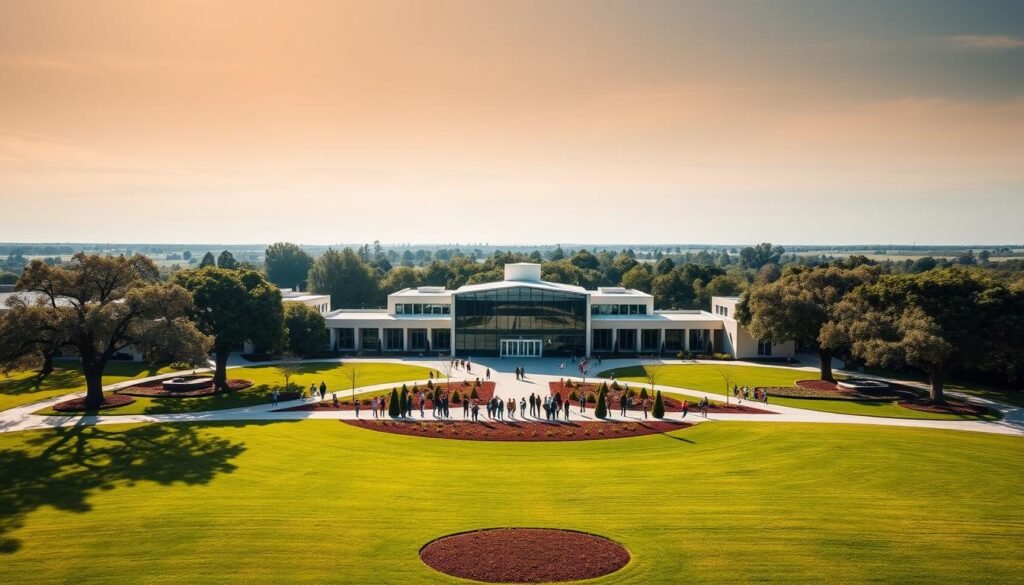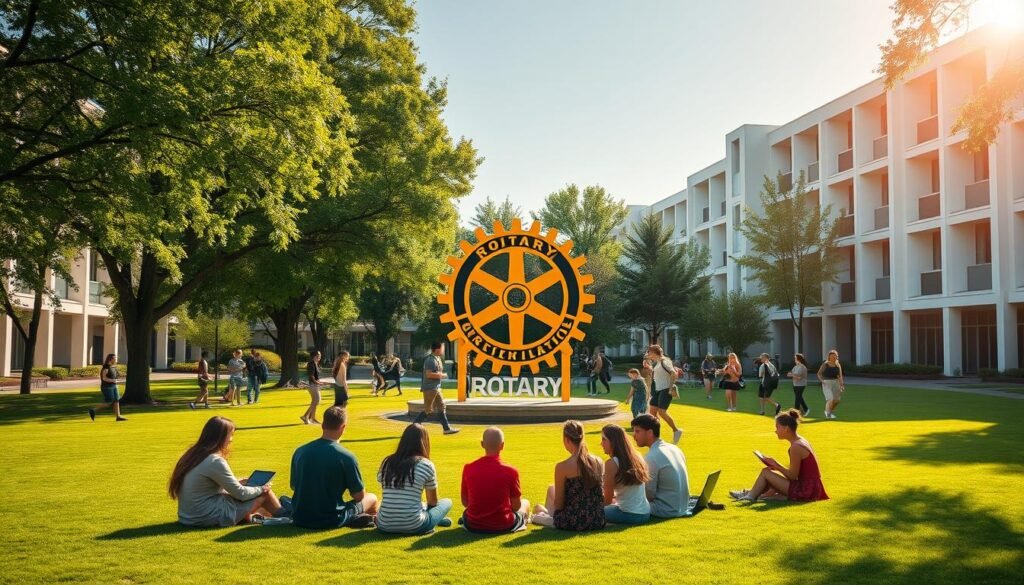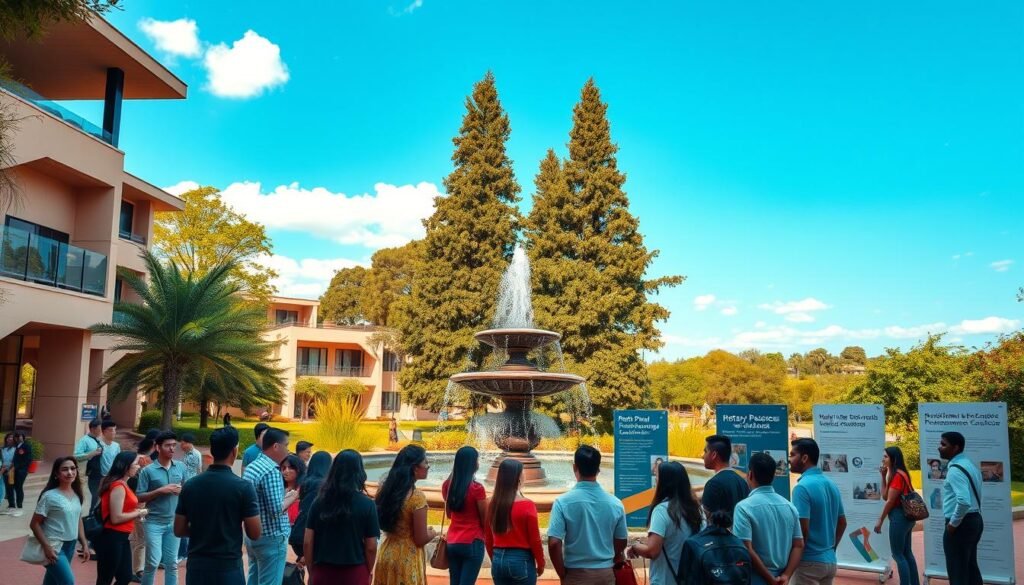
In this program, you will get rigorous academic training, practical field study, and a global network of peers and mentors. Funding covers tuition, living costs, travel, and internship expenses so you can concentrate on learning and impact.
Over 1,800 fellows now work across more than 115 countries in governments, NGOs, research institutions, peacekeeping, and international organizations. You will learn from leaders and professionals who translate ideas into action.
Ready to explore options and next steps? Learn more about the full program details and alumni outcomes at this program guide.
Rotary Peace Fellowships USA campus: What you gain and how it works
The fellowship removes cost barriers so you can focus on applied study, fieldwork, and building impact. You receive full financial support that covers tuition, fees, room and board, round-trip travel, and internship and field-study expenses.
Up to 130 fully funded awards are granted each year: up to 50 for master’s degrees and up to 80 for the professional certificate. This structure creates a competitive cohort of committed learners and practitioners.
- You are likely a mid-career leader with relevant work experience in peace and development.
- You benefit from research-informed academic training, practical assignments, and a self-designed field component.
- You gain access to the rotary peace centers’ global network for mentorship, placements, and peer collaboration.
Why it matters now: funded fellowships link U.S.-based study with global application so you can scale programs, influence policy, or launch new initiatives. You join a community of fellows committed to ethical leadership and sustained international service in the pursuit of peace.
Choose your path: master’s degree or professional development certificate
Choose the pathway that fits your timeline and career goals: a research master or a one-year professional certificate. Each path gives applied training, mentorship, and access to global resources.
Master’s programs: 15–24 months with an applied field study
The master track lasts 15–24 months and blends research-informed teaching with interdisciplinary coursework. You will join a diverse cohort that widens your global perspective.
During the master’s you design a two- to three-month field study aligned to your policy interests or organizational goals. Faculty guidance helps shape a fellowship designed field experience that advances your learning and real-world impact.
Professional development certificate: one-year blended learning
The one-year professional development certificate uses blended online and in-person modules so working professionals can apply lessons immediately. You will complete field studies and lead a social change initiative that shows measurable results.
Designing your social change initiative and applied field experience
You build skills in conflict analysis, monitoring and evaluation, facilitation, and inclusive leadership. Hands-on studies and applied research help you craft evidence-based interventions and policy recommendations.
Faculty and the peace centers support field placements, research, and mentorship. Explore placement options via the international fellowship search to match projects and partners.
Eligibility, timeline, and how to apply from the U.S.
Before you apply, confirm you meet the fellowship’s leadership and service expectations. You should show clear leadership and relevant work experience in development and peace-related work.
Core criteria
Committed community and international service
You must document a record of community and international service and a focused pursuit of peace. Explain your impact, partnerships, and how a fellowship-designed field study will advance your project.
What to prepare
- Demonstrate leadership, professional accomplishments, and relevant work experience.
- Outline a feasible fellowship-designed learning plan and intended field study.
- Engage references and mentors early to provide strong endorsements.
Timeline and tips
Application cycle
The 2026–27 cycle is closed. The 2027–28 application opens online in February 2026.
Each year, up to 130 fully funded awards are available (up to 50 master’s and up to 80 certificate). Track district info sessions, submit early for district review, and align your narrative with the mission of the peace centers to improve your chance of selection.
Your career outcomes and global network
Graduates move into roles that shape policy, manage programs, and lead cross-sector teams worldwide. You join an alumni network with 1,800+ fellows working in 115–140+ countries. That network opens doors in government, NGOs, education, and multilateral institutions.
Where fellows serve:
Where fellows serve: governments, NGOs, education, law enforcement, and the United Nations
You can pursue roles in government agencies, research and education institutions, law enforcement, and international organizations such as the United Nations and the World Bank.
«The training and field studies translate directly into a portfolio that employers respect.«
- Global reach: an active alumni community around the world supports placements and partnerships.
- Career impact: your field and studies experience becomes evidence of leadership and technical skill.
- Professional growth: mentorship from senior professionals accelerates your move into policy and program roles.
You will be positioned to advise on conflict-sensitive development, manage grants, and lead teams that deliver measurable results. The program’s annual 130 fully funded awards keep the network growing and your peer connections strong.
Advance your service pursuit of peace: take the next step today
Set clear milestones today to turn your service goals into an actionable application plan.
Decide whether the master or the professional development certificate best advances your leadership and skills. Then draft a concise impact statement that ties your community and international service to measurable outcomes.
Outline your social change initiative with partners, timeline, and indicators. Gather transcripts, CV, proof of work, and recommendations early so you are ready when the 2027–28 application opens in February 2026.
Contact local alumni and leaders to refine your narrative and plan for the program’s fully funded benefits. Explore placement options and partners via the international fellowship search to match projects and partners.
Take the first step today: set goals, draft your project concept, and prepare to apply so you can focus on social change and international service when the cycle opens.

